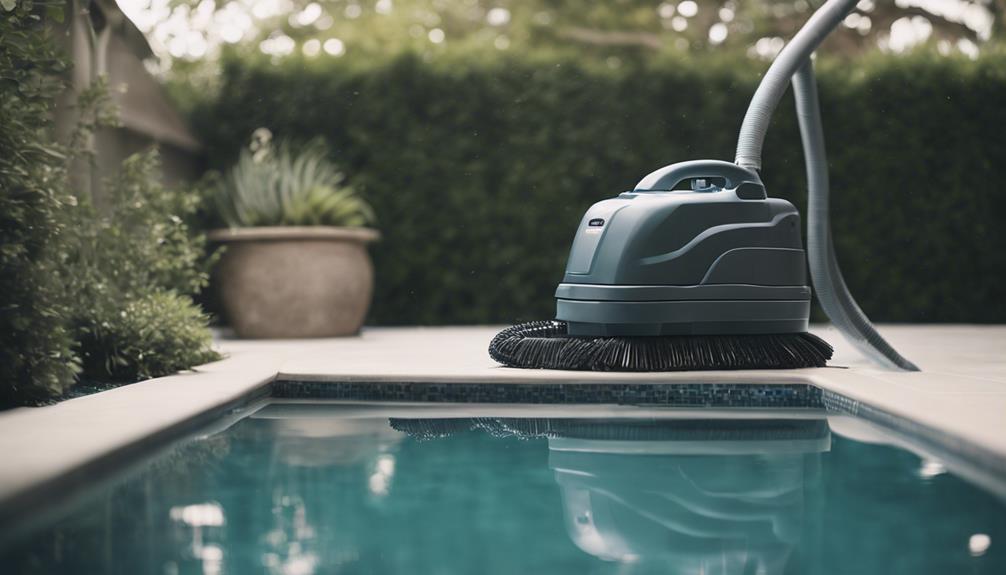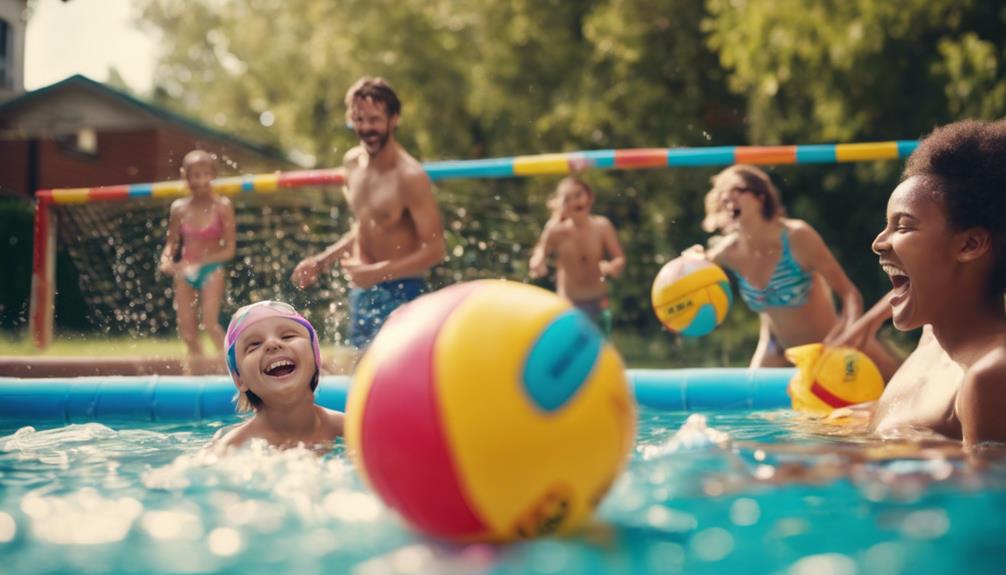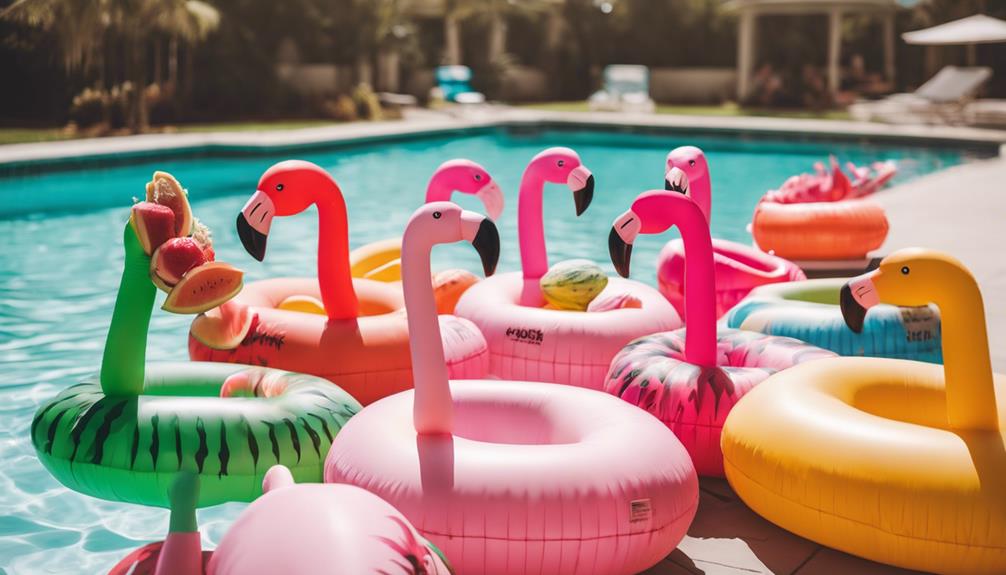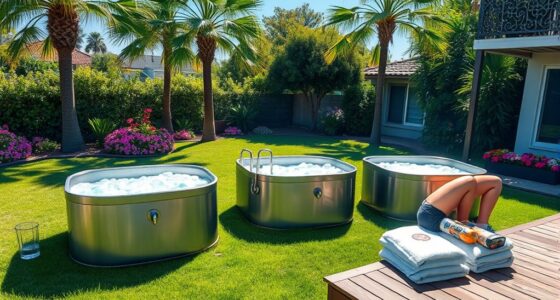To choose the best pool cleaner, consider factors like pool size, cleaning abilities, and surface compatibility. Manual, robotic, suction, and pressure cleaners offer different cleaning methods. Confirm the cleaner reaches all areas effectively and can meet your specific requirements. Look for features like cord length for ease of use. Consulting pool professionals can provide expert guidance on suitable cleaners for your pool. Pool professionals evaluate your pool needs, offer insights into various cleaner types, and advise on maintenance and performance. Ensuring efficient pool cleaning involves selecting a cleaner based on size, surface, and cleaning needs.
Key Takeaways
- Consider pool size, finish compatibility, and specific cleaning needs.
- Ensure the cleaner reaches all areas effectively for thorough cleaning.
- Look for features like cord or hose length for easy maneuverability.
- Consult with pool professionals for expert guidance on selecting the right cleaner.
- Assess if the cleaner can address specific cleaning requirements for your pool.
Types of Pool Cleaners
When considering pool maintenance, it is essential to understand the various types of pool cleaners available on the market.
Manual pool cleaners are simple handheld devices that attach to skimmers or garden hoses, offering tools like poles, skimmers, nets, and vacuum heads for thorough cleaning.
Robotic pool cleaners provide a low-maintenance option with electric motors, pumps, and filters that automatically shut off after cleaning, although they require a higher initial investment.
Suction pool cleaners operate using the pool's existing suction, effectively scrubbing pool floors while utilizing the filtration system.
Pressure pool cleaners, on the other hand, use the pool's pump or a separate booster pump to propel around and collect debris into a bag, offering durability at a higher cost.
Factors to Consider
Key factors when selecting a pool cleaner include the size of the pool, compatibility with the pool finish, and the specific cleaning needs of different areas within the pool. To make an informed decision, consider the following:
- Pool Size: Confirm the cleaner can effectively reach all areas of your pool.
- Compatibility: Choose a cleaner that is suitable for your pool's finish to prevent damage.
- Cleaning Needs: Assess if the cleaner can address specific cleaning requirements such as algae removal or scrubbing walls.
- Convenience: Look for features like cord or hose length to guarantee easy maneuverability and coverage.
Considering these factors will help you select a pool cleaner that meets your pool maintenance needs effectively and efficiently.
Professional Advice

For those seeking expert guidance in selecting the most suitable pool cleaner, consulting with a professional in the field is highly recommended. Pool professionals have the knowledge and experience to assess your specific pool requirements and recommend the most effective cleaner based on factors such as pool size, shape, and cleaning needs.
They can provide valuable insights into the different types of pool cleaners available, such as manual, robotic, suction, and pressure cleaners, and help you understand which option would work best for your pool. Additionally, professionals can offer advice on maintenance, cost-effectiveness, and long-term performance to guarantee you make an informed decision that meets your cleaning goals and budget constraints.
Consulting with a pool expert can lead to a more efficient and satisfactory pool cleaning experience.
Frequently Asked Questions
Can Pool Cleaners Be Used in Saltwater Pools?
Yes, pool cleaners can be used in saltwater pools. Choosing a model that is compatible with saltwater is crucial to avoid damage. Consider robotic or suction cleaners as they are appropriate for this setting, ensuring thorough and efficient cleaning.
Are Pool Cleaners Safe for Vinyl Pool Liners?
Pool cleaners, specifically designed for vinyl pool liners, are safe when used according to manufacturer guidelines. Choose cleaners that won't damage the liner's surface. Consult professionals for advice on selecting the most suitable pool cleaner for your vinyl pool.
How Often Should Pool Cleaners Be Serviced?
On average, pool cleaners should be serviced annually to guarantee peak performance and longevity. Regular maintenance can prevent breakdowns, prolong the lifespan of the cleaner, and enhance pool cleanliness. Consult a professional for servicing recommendations.
Can Pool Cleaners Remove Stubborn Algae?
Pool cleaners vary in their effectiveness against stubborn algae. Robotic cleaners often have powerful suction and scrubbing capabilities, making them ideal for algae removal. However, other types like manual or pressure cleaners may also effectively tackle algae infestations.
Do Pool Cleaners Work on Above-Ground Pools?
Pool cleaners can effectively clean above-ground pools, with options like manual handheld devices, robotic cleaners, suction, and pressure cleaners. Consider the pool's size, finish compatibility, and cleaning requirements when selecting the best cleaner.
Conclusion
To sum up, choosing the optimal pool cleaner necessitates thorough evaluation of different aspects like cleaning effectiveness, upkeep requirements, and suitability for your pool. Seeking guidance from experts can also be beneficial in steering your choice.
Keep in mind, a pristine pool is more than just a indulgence but a must for an invigorating and pleasant swimming session. Therefore, make a prudent selection and immerse yourself in sparkling waters with no concerns about debris or grime.










